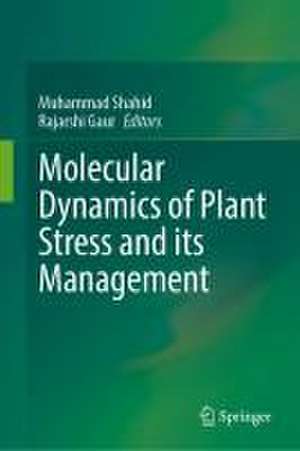Molecular Dynamics of Plant Stress and its Management
Editat de Muhammad Shahid, Rajarshi Gauren Limba Engleză Hardback – 26 iun 2024
Preț: 1676.44 lei
Preț vechi: 2044.43 lei
-18% Nou
Puncte Express: 2515
Preț estimativ în valută:
320.89€ • 348.67$ • 269.72£
320.89€ • 348.67$ • 269.72£
Carte tipărită la comandă
Livrare economică 21 aprilie-05 mai
Preluare comenzi: 021 569.72.76
Specificații
ISBN-13: 9789819716982
ISBN-10: 9819716985
Ilustrații: XVIII, 650 p. 75 illus., 69 illus. in color.
Dimensiuni: 155 x 235 mm
Greutate: 1.11 kg
Ediția:2024
Editura: Springer Nature Singapore
Colecția Springer
Locul publicării:Singapore, Singapore
ISBN-10: 9819716985
Ilustrații: XVIII, 650 p. 75 illus., 69 illus. in color.
Dimensiuni: 155 x 235 mm
Greutate: 1.11 kg
Ediția:2024
Editura: Springer Nature Singapore
Colecția Springer
Locul publicării:Singapore, Singapore
Cuprins
1. Molecular Mechanisms Underpinning Plant Stress Responses: Insights into the Cellular and Systemic Regulation.- 2.Eustressors to improve plant secondary metabolites production: Insect frass and physical factors as examples applied in agriculture and horticulture.- 3. Increased stress tolerance in plants as a result of parental effects.- 4. Impact of different stresses on Morphology, Physiology, and Biochemistry of Plants.- 5. Plant stress responses: past, present and future.- 6. Overview of Cell Signaling Response under Plant Stress.- 7. Effect on Morphology, Physiology, and Biochemistry of Plants under different stress.- 8. Antioxidant defense mechanism and high-temperature stress tolerance in plants.- 9. Plant signaling and response to abiotic stress.- 10. Microbial alleviation of plant stresses: Mechanism and Challenges.- 11.Biotic stressors in the agricultural ecosystem: case of invasive species.- 12. Fusarium Infection of Eggplant: Disease cycle and Management Strategies.- 13.Morphological and Biochemical Stress Induced in Plants Due to Phytoplasma Association.- 14. Viruses as stress factors and their management in vegetable crops.- 15.Plant secondary metabolites for insect resistance: seed –pests Interaction: an Overview.- 16. Emerging threats of exotic viruses to the Oman agriculture: Diversity and Management Strategies.- 17. Identification, Detection and Management of Geminiviruses as Biotic Stress of Vegetable Crops.- 18. Virus –vector interactions and transmission.- 19. Techniques in Plant Stress Management, Including Genetic Engineering, Agronomic Practices, and the Creation of New Crop Types.- 20. Cell signaling response under plants Stress.- 21. New Insight of Nanotechnology in Combating Plant Biotic Stresses: Scope and Potential Applications.- 22. Modern crop improvement approaches for developing abiotic stress-tolerance in plants.- 23. The Intervention of Nanotechnology in the Management of Plant Biotic stresses for Sustainable Agricultural System.- 24. Molecular Action of Bacterial Surfactants in Plant Stress Management.- 25. Tools and techniques used at global scale through genomics, transcriptomics, proteomics, and metabolomics to investigate plant stress responses at the molecular level.- 26. Modern Advances to Combat Plant Viruses and their Vectors.- 27. Nanotechnology-Enabled Approaches to Mitigating Abiotic Stresses in Agricultural Crops.
Notă biografică
Dr. Muhammad Shafiq Shahid has been an Associate Professor at the Department of Plant Sciences, College of Agricultural and Marine Sciences, Sultan Qaboos University, Al-Khoud 123, Muscat, Oman, since 2015. His research interests include epidemiology and population structure of plant viruses, pathogen-host interaction and application of nanotechnology in plant pathogen management. He has been a member of several scientific societies, reviewers for several scientific journals and Guest Associate Editor of one of the major reputed Journal.
Prof. Rajarshi Kumar Gaur been Professor, at the Department of Biotechnology, Deen Dayal Upadhyaya Gorakhpur University Gorakhpur, India, since 2019. His research interests include Plant Virology, Molecular Biology and Bioinformatics. He is fellow of Indian Virological Society and member of the editorial board of various international Journals. Currently he is working on Plant-Virus interaction project funded by Government of India.
Prof. Rajarshi Kumar Gaur been Professor, at the Department of Biotechnology, Deen Dayal Upadhyaya Gorakhpur University Gorakhpur, India, since 2019. His research interests include Plant Virology, Molecular Biology and Bioinformatics. He is fellow of Indian Virological Society and member of the editorial board of various international Journals. Currently he is working on Plant-Virus interaction project funded by Government of India.
Textul de pe ultima copertă
This edited volume focuses on the study of stress in plants and how it can be effectively managed. With the growing global population, the importance of crop yield and stress management has become a critical issue, and this book offers solutions to these challenges. The book explores the impact of abiotic and biotic stressors on plant growth and development, including drought, salinity, temperature stress, pests, and diseases. It also examines the role of genetic engineering and biotechnology in developing stress-tolerant plants. It offers insights on the latest research and advancements in plant breeding, genomics, and proteomics, which are essential in developing crops that can withstand harsh environmental conditions. It offers solutions for managing these challenges, including genetic engineering, proteomics, and genomics. The book provides a detailed overview of the latest research and advancements in plant stress management and offers practical advice on how to apply these findings in real-world scenarios. It explores the impact of climate change on agricultural production and provides insights on how to develop stress-tolerant crops that can withstand changing environmental conditions. With its comprehensive coverage of the latest research and practical insights, the book is an invaluable guide for students, researchers, and professionals looking to develop sustainable agricultural practices and ensure food security for future generations.
Caracteristici
Covers the role of various signaling molecules in plant stress response Highlights the use of latest technologies for stress tolerance in plants Provides the use of molecular dynamics in understanding plant stress and its management
